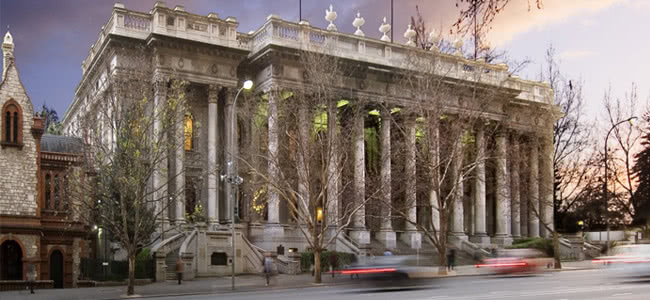Following a difficult twelve months of mixed fortunes over in the City of Churches, in which live music venues were closed permanently under increasing pressure from licensing regulations, the South Australian Government is introducing a ream of tough licensing restrictions to the Adelaide venues in a bid to crack down on alcohol-related violence.
Late night licensed venues will be introducing 3am lockouts and metal detectors, as of 1st October 2013, as part of the new Late Night Trading Code Of Practice, based on a proposal that was first shown by the SA Government last November.
A news release from Adelaide’s Deputy Premier John Rau today says the new legislation is going into action after “six months of consultation with industry and other interested parties including health agencies and SAPOL (South Australian Police).”
Under the Code, “new measures include the use of metal detectors, high-definition CCTV, drink marshalls, as well as an early morning ban on glassware, happy hours, shooters and doubles,” said the Mr Rau, who is also Adelaide’s Attorney General and Minister for Business Services and Consumers. “Under this Code, venues will not be able to accept new patrons after 3am – this does not mean they will close, it just means no bar-hopping.”
Along with the introduction of the 3am lockouts and intensified venue security measures, the Government are also being granted the power to regulate the provision of alcohol between midnight and 7am, with fines for drunken behaviour rising from $160 to $500. “The laws also give a clearer definition of ‘intoxicated’ so that it also includes behaviour that is a result of illicit drugs,” added Minster Rau. “We have recently given Police new powers to search people using metal detectors in and around venues.” “New measures include the use of metal detectors, high-definition CCTV, drink marshalls, as well as an early morning ban on glassware, happy hours, shooters and doubles.” – Minister John Rau
The Deputy Premier said the new venue restrictions under the Late Night Trading Code Of Practice was “vital” in reducing “alcohol related harm on city streets… There are approximately 12,500 hospital admissions and 600 deaths attributable to alcohol in South Australia per year,” said Minister Rau, noting that Police figures “tell us that demand for police and health resources responding to alcohol problems all peak in the early hours of Saturday and Sunday mornings.”
A draft of the Late Night Trading Code Of Practice was released for public consultation in November last year, noting that “this code of practice is not intended to place undue burdens on licensees, but rather is designed to ensure that South Australia’s licensed venues are safe and enjoyable for everyone.”
But the costs of implementing metal detectors, high definition CCTV, and potentially the hiring of drink marshalls can be seen as placing undue financial burdens of licensees and live music venues, who have already faced a difficult year after the introduction of hefty new liquor licensing fees and tariffs for late night venues last year; affecting the business and culture of many Adelaide-based clubs and venues.
Additionally, unlike the mandatory regulations placed on NSW music venues in response to alcohol-related violence last year – the SA Government’s new regulations are not on targeted problem areas, but tar all early morning licensed venues with the same brush. That is except the Adelaide Casino, which under the new Late Night Code is (conveniently) exempt from the new conditions. That’s assuming the bill, which seeks to amend the Liquor Licensing Act 1997, is passed when it is introduced into Parliament next week.
This time last year, in response to the introduction of new licensing fees for venues – hiked up to as much as $5,000 in some cases – Minister John Rau lobbied for the introduction of new, cheaper licenses aimed at creating laneway bars and ‘hole in the wall’ hotspots across Adelaide’s CBD, similar to Melbourne and Sydney’s night culture.
The bill, called the Small Bars License Amendment, was then threatened to be blocked by Liberals opposing the bill getting cleared, but after live music activists SLAM and Labor members threw the spotlight on their plans to introduce stifling amendments to the bill, the Small Bars License Agreement was passed unopposed.
You can view the ne Late Night Trading Code Of Practice at www.cbs.sa.gov.au

































